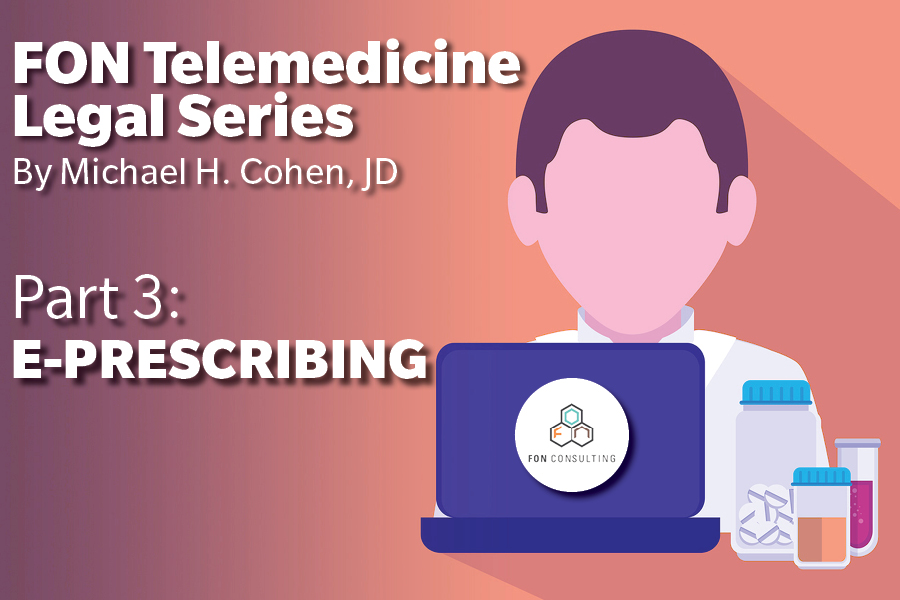Telemedicine Legal Series—Part 3: E-Prescribing

In this Series:
Introduction
Part 1: Practice Issues
Part 2: Licensing Issues
Part 3: e-Prescribing
Part 4: Standard of Care Issues
Part 5: HIPAA Issues
Part 6: Mobile Medical Apps
Part 7: Unlicensed Practice, Fee-Splitting, and other Legal Hazards
Conclusion
The law handles telemedicine prescription differently than diagnosing and treating remotely. How can you best comply?
Prescribing is Different Than Other Treatment
This is a tricky thing about telemedicine law; you need to read the statutes carefully and see whether they say something specific about “prescribing,” as opposed to “diagnosis” and “treatment.”
Normally, state laws and/or medical board regulations are tougher on remote prescribing because of the abuses associated with Internet pharmacies, especially during the early days of the Internet.
As a result of those abuses, the federal government passed the Ryan-Haight Online Pharmacy Consumer Protection Act.
Among other things, the Act:
- Toughened restrictions and reporting requirements on Internet pharmacies.
- Prohibited the sale of controlled substances on the Internet without a valid prescription.
- Required an in-person medical evaluation of the patient as part of the definition of “valid prescription.”
- Provided for federal enforcement authority with respect to violations.
The Act was named after a teenager who acquired prescription narcotics from an online website after filling out a questionnaire; the physician who wrote the prescription never saw the patient.
However, states regulate what physicians must have in place before providing a prescription related to an online physician-patient encounter.
State Law Regulation of Internet Prescribing
The big question is whether a physician has to see a patient in person before prescribing a medication, or when a physician should see a patient before prescribing medication.
States differ as to their answers. Lawyers sometimes provide differing recommendations than ‘the state answers’ or from ‘other lawyers’.
The most conservative model is to require an in-person physical exam before the physician prescribes any medication (whether or not a controlled substance). In fact, many early telemedicine statutes required this, and many physicians see patients at least once (or more conservatively, at least once a year) before prescribing.
There are states with looser requirements. For example, the Virginia Board of Medicine’s statement on Telemedicine gives physicians a lot of latitude to make judgment calls on the appropriateness of prescriptions via telemedicine. Firstly, Virginia says:
“Prescribing medications, in-person or via telemedicine services, is at the professional discretion of the prescribing practitioner.”
(bold added)
This is a very broad, permissive opening statement. The Virginia Board goes on to say:
“The indication, appropriateness, and safety considerations for each prescription provided via telemedicine services must be evaluated by the practitioner in accordance with applicable law and current standards of practice and consequently carries the same professional accountability as prescriptions delivered during an in-person encounter. Where such measures are upheld, and the appropriate clinical consideration is carried out and documented, the practitioner may exercise their judgment and prescribe medications as part of telemedicine encounters in accordance with applicable state and federal law.”
Note, the Virginia Board emphasizes the practitioner’s judgment. Of course, previously, the statement has clarified that the physician must do more than have the patient fill out an online questionnaire.
Enjoying this article? Subscribe and get our latest, delivered straight to your inbox.
Contrast this with Florida’s telemedicine rules, which not only prohibit prescribing based on an electronic questionnaire, but also require, among other things, a “documented patient evaluation, including history and physical examination to establish the diagnosis for which any legend drug is prescribed.”
Delaware legislation takes a middle ground. Firstly, Delaware law mirrors the prohibition against basing a prescription only on the patient’s response to a questionnaire sent by email or filled out online:
“A physician may not prescribe solely in response to an Internet questionnaire, an Internet consult, or a telephone consult.”
With this language, Delaware, also in addition to other states, warns against basing a prescription only on an Internet or phone consult.
Having given the above prohibition, Delaware law then goes on to say that a physician can prescribe via telemedicine (i.e., outside an in-person encounter) so long as the physician has first “established” the physician-patient relationship.
Delaware law uses some of the Federation concepts, and adds to them. It provides that a physician “establishes” the physician-patient relationship either by seeing the patient in person, or by means of including these seven points:
- fully verifying and authenticating the location and, to the extent possible, identifying the requesting patient;
- disclosing and validating the provider’s identity and applicable credential(s);
- obtaining appropriate consents from requesting patients after disclosures regarding the delivery models and treatment methods or limitations, including informed consents regarding the use of telemedicine technologies as indicated in subsection (5) below;
- establishing a diagnosis through the use of acceptable medical practices, such as patient history, mental status examination, physical examination (unless not warranted by the patient’s mental condition), and appropriate diagnostic and laboratory testing to establish diagnoses, as well as identify underlying conditions or contra-indications, or both, to treatment recommended or provided;
- discussing with the patient the diagnosis and the evidence for it, the risks and benefits of various treatment options; and
- ensuring the availability of the distant site provider or coverage of the patient for appropriate follow-up care; and
- providing a written visit summary to the patient.
While many of these are already standard obligations of the physician, Delaware law focuses some of these on telemedicine. For example, if the physician is out-of-state but the patient is in Delaware and the physician is working with a Delaware nurse, then (2) requires the physician to validate the nurse’s credentials.
North Carolina’s Liberal Position
Like its sister states, North Carolina provides that prescribing online based solely on the use of Internet questionnaires is inappropriate and unprofessional.
However, North Carolina provides that in certain situations, a physician may prescribe for a patient even when the physician has not personally examined the patient.” These situations include:
- admission orders for a newly hospitalized patient;
- medication orders or prescriptions, including pain management, from a hospice physician for a patient admitted to a certified hospice program, prescribing for a patient of another licensee for whom the prescriber is taking call;
- continuing medication on a short-term basis for a new patient prior to the patient’s first appointment;
- an appropriate prescription in a telemedicine encounter where the threshold information to make an accurate diagnosis has been obtained;
- prescribing an opiate antagonist to someone in a position to assist a person at risk of an opiate-related overdose.
In addition, the North Carolina Board noted several other instances in which the good faith exam for prescribing can be online:
- established patients may not require a new history and physical examination for each new prescription, depending on good medical practice;
- prescribing for an individual whom the licensee has not met or personally examined may also be suitable when that individual is the partner of a patient whom the licensee is treating for gonorrhea or chlamydia.
These rules represent considerable liberalizing of the stricter requirement of an in-person visit to prescribe.
Controlled Substances
Notwithstanding the somewhat liberalized rules regarding e-prescribing in some states, many states (such as Florida) provide that physicians may not prescribe controlled substances through the use of telemedicine.
Conclusion
The legal side of E-Prescribing is often more laborious for the physician than actual diagnosis and treatment. Because states differ in their definition of doctor/patient relationship—for the purpose of telemedicine encounters—it is paramount to obtain the most current rules for applicable jurisdictions.
Contact the Michael H. Cohen Law Group for a telemedicine legal consult that fits your particular business model.
Reading this article does not create an attorney-client relationship with its author or with the Michael H. Cohen Law Group. This is an informational and educational piece; it does not constitute legal advice. If you’d like legal advice, consult an attorney for advice specific to your situation.
About FON
FON is a leading integrative health and medicine business development and strategy consulting firm. FON specializes in custom solutions for growing patient volume, developing programs, and increasing product sales. Our practical business models are driven by innovative marketing, clear messaging, and customer engagement via branded storytelling.
Contact us today to schedule a complimentary 30-minute consultation to discuss your business development or personal brand needs.
The Michael H. Cohen Law Group counsels health technology companies and providers on healthcare legal issues and FDA legal and regulatory matters. Legal counsel includes corporate and transactional healthcare matters, healthcare regulatory compliance, and healthcare litigation and dispute resolution. Attorney Michael H. Cohen is an internationally recognized author, speaker on healthcare law and FDA law, and expert in developing legal strategies for healthcare ventures, including integrative medicine, anti-aging and functional medicine, telemedicine and concierge medicine.


